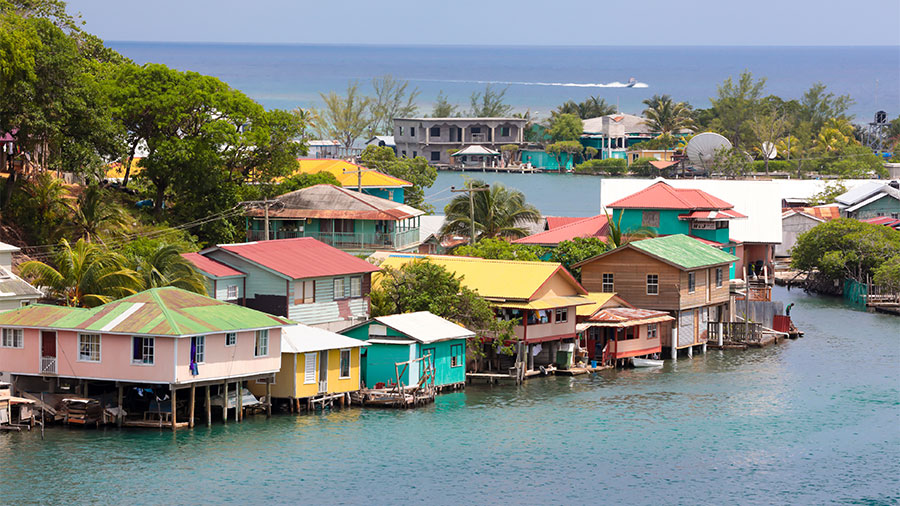Household Environment, Climate Anomalies Linked to Childhood Respiratory Problems in Honduras
By: Karen Michael
Household environment, temperature, and rainfall anomalies are linked to children's health in Honduras, according to research published by a team from Texas Tech University earlier this year.
Cristina Bradatan, Jeffrey A. Dennis, Nadia Flores-Yeffal and Sharmistha Swain published a paper in "Environmental Health" showing there is a link between respiratory problems in children and climate change in Honduras. They also argue that there is a need for research on the topic of climate change and human health.

Bradatan, an associate professor of sociology in the Department of Sociology, Anthropology, and Social Work, said as a demographer, she relies on good quality data. The team found that data within the Demographic and Health Survey, which detailed living conditions for 4,000 households in Honduras, including children's health, what sort of cooking fuels they use, and whether they have access to clean water, toilets, and flooring. Bradatan said she was surprised to learn that many people in Honduras live in poor-quality conditions, such as dirt floors and limited access to clean water.
Because the survey had GPS location information, Texas Tech researchers were able to ascertain whether the Hondurans were being affected by climate anomalies. They chose to focus on Honduras because it is one of the least developed countries in Latin America, and it has significant environmental issues. Honduras also has a high percentage of children under age 15 among its population, and there are a limited number of studies focused on the country. Almost 40 percent of the citizens work in agriculture.
"There is not much attention paid to a country like Honduras," said Flores-Yeffal, associate professor of sociology at Texas Tech.
Flores-Yeffal started her research career looking at immigration to the U.S. from Mexico. But she said the number of Mexican immigrants has really dropped in recent years, and most immigrants are coming through Mexico from the countries of El Salvador, Guatemala, and Honduras, who are trying to escape violence, poverty, and climate change.
Climate change is expected to have both direct impacts on Earth's population due to the increasing frequency of extreme weather events, and indirect, mediated effects like pollution, water-borne illnesses, and malnutrition, according to the researchers. All populations may suffer from the effects of climate change, but the impact on vulnerable populations such as children, seniors, and poor people will be more substantial.
Many children in Honduras are living in homes where people cook indoors over fires despite not having proper ventilation, Flores-Yeffal said, which tends to cause more respiratory issues.
"We also found that the homes that had dirt floors – so you're talking about people that lie in extreme poverty – so they have no toilets, they have dirt floors. It's more likely that their health will be affected, especially the children's health. The children who live in those types of homes have a higher incidence of diarrhea," Flores-Yeffal said.
Bradatan said these children also live in homes where the main source of water is directly from a nearby lake.
Fluctuations in temperature and humidity in the area, as well as having more floods or droughts, have wreaked havoc on the largely agrarian country, Flores-Yeffal said. Without rain, crops fail, and Honduras has no safety net for farmers whose crops fail. People who were already poor are seeing even more losses during unpredictable weather and climate events.
"They've been relying on the rain, they've been relying on that way of living," Flores-Yeffal said. "If their crops don't make, that's it."
Bradatan said researchers found that with all of the challenges that Hondurans face, climate change is adding to the existing problems. The western part of Honduras has become drier and hotter than it was in the past.
While infant mortality and diarrhea incidence were not directly linked to climate change by the data in the Texas Tech research, the climate anomalies could be linked to a higher incidence of respiratory illness.
Bradatan said Hondurans cannot change the climate anomalies around them, so the Honduran government or the international aid agencies need to address basic issues like access to water, sanitation, and clean fuel for cooking. Addressing these issues would have a significant effect on children's health in Honduras, according to the paper, and will also function as an adaptation to climate change.
Discoveries
-
Address
Texas Tech University, 2500 Broadway, Box 41075 Lubbock, TX 79409 -
Phone
806.742.3905 -
Email
vpr.communications@ttu.edu
